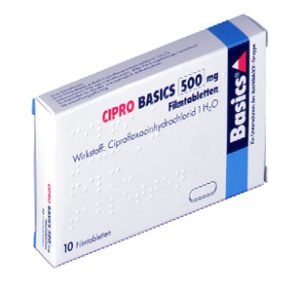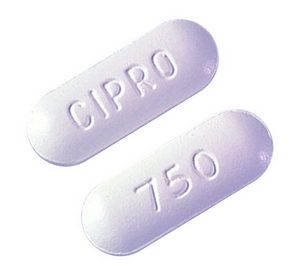 Cipro is a broad-spectrum antibiotic that belongs to the group of fluoroquinolones. The drug effectively treats infections of the respiratory tract, ENT organs, and the urogenital tract.
Cipro is a broad-spectrum antibiotic that belongs to the group of fluoroquinolones. The drug effectively treats infections of the respiratory tract, ENT organs, and the urogenital tract.
Form of release
The drug is produced with ciprofloxacin as the active ingredient in the form of tablets for oral use. The dosages of the drug are 250 mg, 500 mg, or 750 mg.
Description and composition
Ciprofloxacin is a substance with antimicrobial activity that has a wide spectrum of action.
The highest activity of the drug is manifested in the treatment of infections caused by aerobic gram-positive and gram-negative microorganisms such as Escherichia, Shigella, and Salmonella. Besides these, it is also active against staphylococci, mycoplasmas, and chlamydia.
Resistance to ciprofloxacin is possible, but it develops gradually.
Indications for use
Indications for the use of ciprofloxacin in adults include:
- Respiratory infections, including pneumonia
- Infections of the middle ear and sinusitis
- Infections of soft tissues and skin
- Diseases of the bones and joints
- Infections of the kidneys and urinary tract
- Diseases of the genital organs, including gonorrhea and prostatitis
- Diseases of the gastrointestinal tract
Conversely, the use of Cipro in children is limited because possible adverse effects on the formation of bone tissue have been revealed.
 According to general recommendations, the use of this medication in children younger than 18 years of age is contraindicated, except in the following instances:
According to general recommendations, the use of this medication in children younger than 18 years of age is contraindicated, except in the following instances:
- In those with complicated urinary tract infections and pyelonephritis
- In severe bronchopulmonary diseases in children with cystic fibrosis
- Contraindications
- Cipro should not be used in the following cases:
- Pregnancy and lactation
- Increased sensitivity to the main active ingredient
- In conjunction with the administration of tizanidine
Dosages
The average recommended daily doses for adults are:
- Respiratory infections: 1,000 mg to 1,500 mg
- Urinary tract infections: 500 mg to 1,500 mg
- Acute gonorrhea: 500 mg once
- Diarrhea: 1,000 mg
- Infections of the genitals: 500 mg to 1,500 mg
In most cases, the dosages mentioned above are divided into two portions and taken at regular intervals.
Side effects
Side effects of Cipro administration include:
- Hemopoiesis system: a decrease in the level of leukocytes and platelets, anemia, and/or an increase in the level of eosinophils
- Immune system: allergic reactions, including immediate type
- Mental disorders: migraine, dizziness, insomnia, depression, confusion, and hallucinations
- Sense organs: hearing and vision impairment, double vision or pain in the eyes, and a change in taste
- Heart and blood vessels: tachycardia, stenocardia, arrhythmia, vasculitis, hemorrhagic diathesis, vasodilation, and/or pressure drop
- Respiratory organs: respiratory failure, nosebleeds, bronchospasm, and pulmonary embolism
- Gastrointestinal tract: dyspepsia, flatulence, nausea, diarrhea, and abdominal pain
- Bones and muscles: inflammatory processes, tenderness
- Skin: dermatitis, itching, photosensitivity, and/or erythema
- The urinary system: the appearance of blood and uncharacteristic inclusions in the urine
In addition to these, there also may be increased sweating, general malaise, swelling, and/or a violation of gait.
The most frequent side effects seen in children are pathological processes in the joints.